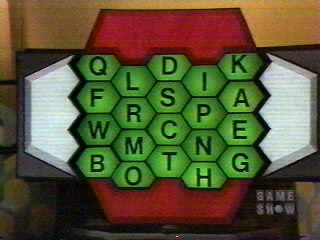Blockbusters

Blockbusters
Host: Bill Cullen, Bill Rafferty
Announcer: Bob Hilton, Rich Jeffries
Airtime: Bill C: 10:30-11:00 AM, weekdays
Premise: Are two heads better than one?
Rules: In the 1980 version, a solo player took on a related (not married) pair of players in a game. 20 letters of the alphabet made up the battlefield:

A random letter was chosen to begin the game, and a sample question might be: "What D is the capital of Delaware?" The first player to buzz in and give the right answer won the hexagon for their side. If a solo player blew a question, only one partner could answer, with conference. The solo player tried to connect top to bottom (minimum four answers) and the family pair connected left to right (minimum five answers, the extra answer was the handicap afforded the solo player.) Whoever connected their ends won the round and $500. Two rounds won the match and allowed the player (one-half of the family pair) ro play the Gold Rush.
Bonus Game: In the Gold Rush, the player had 60 seconds to connect left to right. Most answers were two to five initials long, but some were only one. The player would call a hexagon, Bill would read the clue, and the player would answer. A right answer turned the hexagon gold and the player would continue moving on. A wrong answer meant the hex turned black and the player would have to work around it. Given 60 seconds, most players were able to win the game unless they blocked themselves out by getting an entire column of answers wrong. Accomplishing the task won $2500 for the first win in a match, the second game was the Super Gold Rush, played for $5,000. If the player ran out of time before a connection was made, or the player was blocked out, $100 was paid for each gold block on the board. Bill would go over the missed questions, if any, and the main game would begin again. Starting with the 91st episode, Bill began referring to the endgame as "Gold Run."
A player or family pair could win up two eight matches, play the Gold Rush 16 times, and win $60,000. LaRae Dillman was the only player to reach that mark, and won $47,000. Two sets of family pairs were also big winners, with over $18,000 and $26,000.
After four weeks of shows, the format changed. The main game was now best-of-three, with each win worth $500. The winner would then play Gold Rush for $5,000. Champions could now stay on for up to ten games, and win $60,000. Two solo players won the maximum, and two more won over $50,000. One family pair won $51,200 in their campaign.
In 1982, toward the end of the run, the winnings limit was raised to twenty games (meaning a champion could be on the show for a month) and the total winnings increased to $120,000. One solo player and one family pair won the maximum.
Grand Champions List
| Solo Player | Winnings | Family Pair | Winnings |
| John Hatten | $120,000 | Liz and Pat McCarthy | $120,000 |
| Leland Yung | $106,600 | Cathy Thomas/John Shannon | $51,200 |
| Kandi Doyle | $78,400? | Alan and Jeff Dennis | $37,000 |
| Sherry Lucas | $60,000 |
| LaRae Dillman |
| Gene Vissich(k?) | $46,700 |
Kandi returns, increasing her total to $62,800.
Larae Dillman gets up to $65,000.
Sherry Lucas: $66,500.
Kathy Thomas and John Shannon return to win $59,300.
Leland Yung returns, wins another ten games, and wins $106,600.
Gene Vissich returns on the very last show, wins the final match of the series and $5,000 to go with it (no Gold Run was played) for a final total of $51,700.
The 1987 version, which ran for 17 weeks, eliminated the family pair. The champion played as white, the challenger red. The challenger had the advantage in round one, the champion in round two, and game three, if necessary, was a 4 x 4 matrix. The champion played Gold Rush as before, but the game now had a jackpot starting at $5,000; and increasing as much each time until won.
Click here to return to the home page.
Click here to return to the Rules/Reviews page.


